初中英语翻译疑问句
初中反义疑问句
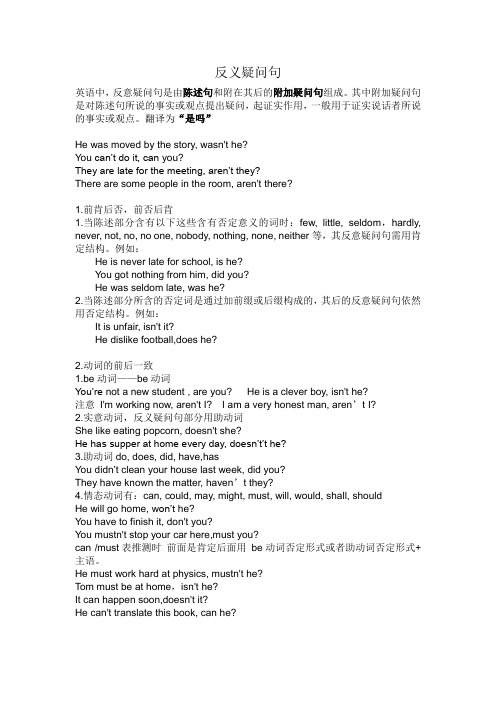
反义疑问句英语中,反意疑问句是由陈述句和附在其后的附加疑问句组成。
其中附加疑问句是对陈述句所说的事实或观点提出疑问,起证实作用,一般用于证实说话者所说的事实或观点。
翻译为“是吗”He was moved by the story, wasn't he?You can’t do it, can you?They are late for the meeting, aren’t they?There are some people in the room, aren't there?1.前肯后否,前否后肯1.当陈述部分含有以下这些含有否定意义的词时:few, little, seldom,hardly, never, not, no, no one, nobody, nothing, none, neither等,其反意疑问句需用肯定结构。
例如:He is never late for school, is he?You got nothing from him, did you?He was seldom late, was he?2.当陈述部分所含的否定词是通过加前缀或后缀构成的,其后的反意疑问句依然用否定结构。
例如:It is unfair, isn't it?He dislike football,does he?2.动词的前后一致1.be动词——be动词You’re not a new student , are you? He is a clever boy, isn't he?注意I'm working now, aren't I? I am a very honest man, aren’t I?2.实意动词,反义疑问句部分用助动词She like eating popcorn, doesn't she?He has supper at home every day, doesn’t’t he?3.助动词do, does, did, have,hasYou didn’t clean your house last week, did you?They have known the matter, haven’t they?4.情态动词有:can, could, may, might, must, will, would, shall, shouldHe will go home, won’t he?You have to finish it, don't you?You mustn't stop your car here,must you?can /must表推测时前面是肯定后面用be动词否定形式或者助动词否定形式+主语。
初中英语翻译疑问句

初中英语翻译疑问句1) 陈述部分的主语是I,疑问部分要用aren't I.I'm as tall as your sister,aren't I?2) 陈述部分的谓语是wish,疑问部分要用may +主语。
I wish to have a word with you, may I?3) 陈述部分用no, nothing, nobody, never, few, seldom, hardly, rarely, little等否定含义的词时,疑问部分用肯定含义。
The Swede made no answer, did he / she?Some plants never blown (开花), do they ?4) 含有ought to 的反意疑问句,陈述部分是肯定的,疑问部分用shouldn't / oughtn't +主语。
He ought to know what to do, oughtn't he? / shouldn't he?5) 陈述部分有have to +v. (had to + v.),疑问部分常用don't +主语(didn't +主语)。
We have to get there at eight tomorrow, don't we?6) 陈述部分的谓语是used to 时,疑问部分用didn't +主语或usedn't +主语。
He used to take pictures there, didn't he? / usedn't he?7) 陈述部分有had better + v. 疑问句部分用hadn't you?You'd better read it by yourself, hadn't you?8) 陈述部分有would rather +v.,疑问部分多用wouldn't +主语。
疑问句翻译及答案

疑问句翻译一般疑问句be/助动词/情态动词+主语+其他成分?1.每天花那么多时间在电脑游戏方面有必要吗?、2.您能告诉我一些关于期中考试的事情?3.网上购物将会取代传统的购物方式吗?4.你是否拿了我放在桌面的钥匙?5.你是否知道这里禁止吸烟?6.你打算参加即将到来的运动会吗?7. 你还没有完成老师布置的作业?特殊疑问句特殊疑问词+be/助动词/情态动词+主语+其他what & which 8.这个男孩的妈妈年轻时喜欢干什么?9.当我们学习英语时,应该注意什么?10.吸烟对我们有什么影响?12. 谁将会做一个关于如何节约水电的讲座?\13. 你已经在这儿呆了多长时间了?选择疑问句结构:一般疑问句+or+其他成分14 你喜欢单独旅游还是和朋友一起出游?15 你将搭乘飞机还是火车离开?一般疑问句+疑问词+从句, (从句采用正常语序)16.你知道有多少人将来听这个演讲吗?17.您介意告诉我是谁负责这个部门吗?18.您能告诉我怎样才能联系上她吗?19 你能告诉我他何时将到国外进修吗?20 你明白李教授刚才所说的话吗?1. Is it necessary to spend so much time on computer games every day?2. Can you tell me something about the Mid-term exam?3. Will online shopping take the place of the traditional shopping?4. Did you take the key (which/ that was ) put on the table by me?5. Do you know that smoking is forbidden here?6. Are you going to take part in the coming sports meeting?7. Haven’t you finished the homework assigned by teacher (yet) ?8. What did the boy’s mother enjoy doing when she w as young?9. What should we pay attention to when we learn English?10. What effect does smoking have on us?11. Who will make a speech about how to save water and electricity?12. How long have you stayed here?13Do you like to travel alone or with your friends?14Will you leave by air or by train?15Would you mind telling me who is in charge of the department?16Could you tell me how I can get in touch with her?17 Can you tell me when he will go abroad for further education?18 Do you understand what professor Li said just now?。
不同时态与语态在疑问句中翻译

(五)反意疑问句 1. 他们昨天没有扫扫教室,是吗? They didn’t clean the classroom yesterday, did they? 2. 你会来的,不是吗 You’re coming,aren’t you? 3. 约翰不喜欢茶,是吗? John doesn’t like tea,does he? 4. 她不会游泳,对吗? She can’t swim,can she?
பைடு நூலகம்
5. 你今晚有空吗? Will you be free tonight? 6. 你会打篮球吗? Can you play basketball? 7. 她扫除了吗? —Does she do the cleaning? 8.你到过那里吗? —Have you been there? 9.你不是史密斯先生吗? —Are you not Mr Smith? 10. 把她带到医院了吗? Has she been taken to hospital?
现在进行时: 1. 现在情况怎么样? How are things going? 2. 你怎么不穿大衣呢? Why aren't you wearing a coat? 3. 他们被警方盘问吗? Are they being questioned by police? 4. 这个案子正在调查吗? Is the case being investigated?
现在完成时: 1. 你的钥匙丢了吗? Have you lost your keys? 2. 你多长时间没见过她了? How long haven't you seen her? 3. 这个星期你收了多少封信? How many letters have you received this week? 4. 他们有没有被告知不要到那里游泳? Have they been warned not to swim there?
疑问句知识点详解(初中英语专项复习)9
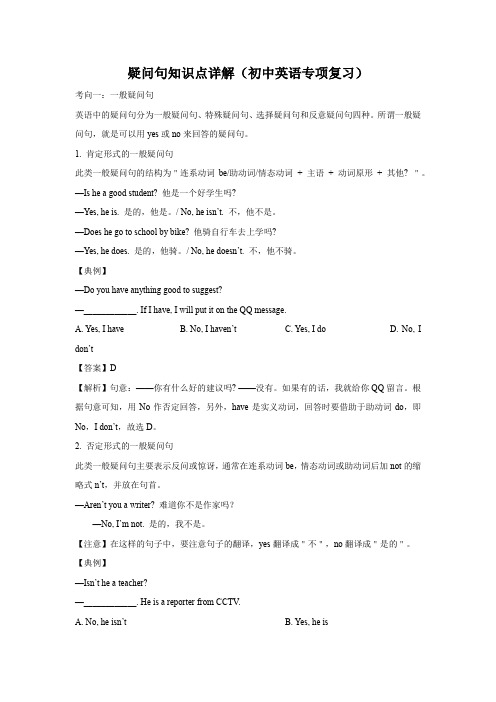
疑问句知识点详解(初中英语专项复习)考向一:一般疑问句英语中的疑问句分为一般疑问句、特殊疑问句、选择疑问句和反意疑问句四种。
所谓一般疑问句,就是可以用yes或no来回答的疑问句。
1. 肯定形式的一般疑问句此类一般疑问句的结构为"连系动词be/助动词/情态动词+ 主语+ 动词原形+ 其他? "。
—Is he a good student? 他是一个好学生吗?—Yes, he is. 是的,他是。
/ No, he isn’t. 不,他不是。
—Does he go to school by bike? 他骑自行车去上学吗?—Yes, he does. 是的,他骑。
/ No, he doesn’t. 不,他不骑。
【典例】—Do you have anything good to suggest?—____________. If I have, I will put it on the QQ message.A. Yes, I haveB. No, I haven’tC. Yes, I doD. No, I don’t【答案】D【解析】句意:——你有什么好的建议吗? ——没有。
如果有的话,我就给你QQ留言。
根据句意可知,用No作否定回答,另外,have是实义动词,回答时要借助于助动词do,即No,I don’t,故选D。
2. 否定形式的一般疑问句此类一般疑问句主要表示反问或惊讶,通常在连系动词be,情态动词或助动词后加not的缩略式n’t,并放在句首。
—Aren’t you a writer? 难道你不是作家吗?—No, I’m not. 是的,我不是。
【注意】在这样的句子中,要注意句子的翻译,yes翻译成"不",no翻译成"是的"。
【典例】—Isn’t he a teacher?—____________. He is a reporter from CCTV.A. No, he isn’tB. Yes, he isC. Yes, he isn’tD. No, he is【答案】A【解析】句意:——他不是一个老师吗?——是的,他不是(老师),他是中央电视台的记者。
疑问句翻译+作文范文
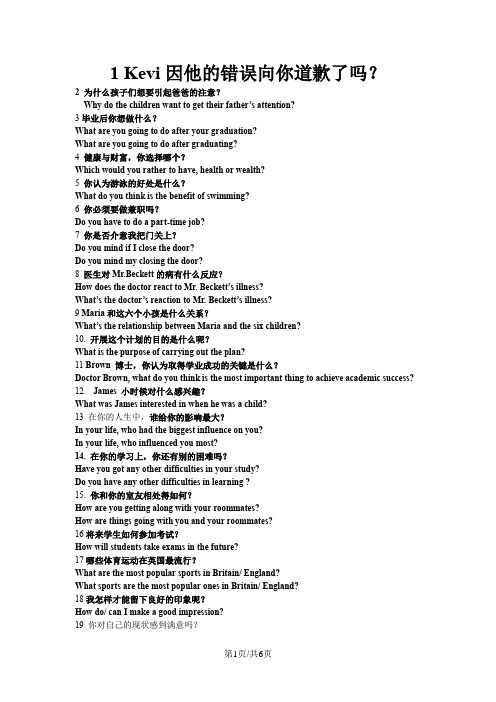
1 Kevi因他的错误向你道歉了吗?2 为什么孩子们想要引起爸爸的注意?Why do the children want to get their father’s attention?3毕业后你想做什么?What are you going to do after your graduation?What are you going to do after graduating?4 健康与财富,你选择哪个?Which would you rather to have, health or wealth?5 你认为游泳的好处是什么?What do you think is the benefit of swimming?6 你必须要做兼职吗?Do you have to do a part-time job?7 你是否介意我把门关上?Do you mind if I close the door?Do you mind my closing the door?8 医生对Mr.Beckett的病有什么反应?How does the doctor react to Mr. Beckett’s illness?What’s the doctor’s reaction to Mr. Beckett’s illness?9 Maria和这六个小孩是什么关系?What’s the relationship between Maria and the six children?10. 开展这个计划的目的是什么呢?What is the purpose of carrying out the plan?11 Brown 博士,你认为取得学业成功的关键是什么?Doctor Brown, what do you think is the most important thing to achieve academic success?12.James 小时候对什么感兴趣?What was James interested in when he was a child?13 在你的人生中,谁给你的影响最大?In your life, who had the biggest influence on you?In your life, who influenced you most?14. 在你的学习上,你还有别的困难吗?Have you got any other difficulties in your study?Do you have any other difficulties in learning ?15. 你和你的室友相处得如何?How are you getting along with your roommates?How are things going with you and your roommates?16将来学生如何参加考试?How will students take exams in the future?17哪些体育运动在英国最流行?What are the most popular sports in Britain/ England?What sports are the most popular ones in Britain/ England?18我怎样才能留下良好的印象呢?How do/ can I make a good impression?19 你对自己的现状感到满意吗?Are you satisfied with your current situation?20 虽然付出了努力,但是没有获得回报值得吗?Is it worthwhile that you make good efforts without any rewards?For you, Is it worth working hard without any rewards?21 你的目标是什么,获得成功还是学有所获?What’s the goal, achieving success or learning something?22 你可以想象女性在艰难的环境中是如何生孩子的吗?Can you imagine how the women give birth to babies in difficult conditions?23 当朋友处于困境中,如何让朋友振奋起来了?When your friends are in trouble, how do you cheer him/her up?24 用微信进行支付,给人们的生活带来了哪些便利?What convenience does We-chat pay bring people’s life?优秀作文分享(一)假如你是李华,计划和你班同学去参加某一社区组织的环保活动。
翻译疑问句

翻译疑问句1. What time is it now?现在几点了?2. Can you speak English?你会说英语吗?3. Where is the nearest hospital?最近的医院在哪里?4. How much does this cost?这个多少钱?5. Why did you do that?你为什么这样做?6. Do you know where he went?你知道他去了哪里吗?7. What is your favorite food?你最喜欢的食物是什么?8. Who is coming to the party tonight? 今晚谁要来参加派对?9. How far is it from here to the airport? 从这里到机场有多远?10. When will you be back?你什么时候回来?11. Are you sure about that?你对此确定吗?12. Are you busy right now?你现在忙吗?13. What's the weather like tomorrow?明天的天气怎样?14. Can you help me with this problem?你能帮我解决这个问题吗?15. Are you going to the concert tonight?你今晚要去音乐会吗?16. Have you seen my keys?你看到我的钥匙了吗?17. How long did it take you to finish the project?你完成这个项目花了多长时间?18. What did you think of the movie?你觉得那部电影怎么样?19. Can you recommend a good restaurant in this area? 你能推荐一家好的餐厅吗?20. Why are you late?你为什么迟到了?21. What are you doing this weekend?你这个周末打算做什么?22. How can I improve my English speaking skills?如何提高我的英语口语能力?23. Are you sure you understood the instructions?你确定你理解了指示吗?24. What's your opinion on the matter?你对这件事有什么意见?25. Is there any chance of getting a refund?有可能退款吗?26. Can you give me some directions to the nearest gas station? 可以告诉我去最近的加油站的路吗?27. Do you know what time the train leaves?你知道火车几点开吗?28. How often do you go to the gym?你多久去一次健身房?29. Can you please repeat that?你能再说一遍吗?30. What do you want to do for dinner?晚饭你想吃什么?31. Are you feeling okay?你感觉好吗?32. Can you explain that to me?你能解释给我听吗?33. What's the name of this song?这首歌叫什么名字?34. Are you going to the party tomorrow?你明天要去派对吗?35. Can you teach me how to cook this dish?你能教我如何烹饪这道菜吗?36. Why did you choose that color?你为什么选择那个颜色?37. What's the best way to learn a new language? 学习一门新语言最好的方法是什么?38. Can you lend me some money?你能借我一些钱吗?39. Why did you decide to study abroad?你为什么决定出国留学?40. What are your plans for the weekend? 你这个周末有什么计划?。
初中英语祈使句、 感叹句、反义疑问句和there be句型

【课堂演练】祈使句的用法指表示请求、命令、建议或劝告等的句子。
句中通常不带主语,谓语动词用原形,句末用叹号或句点。
1、以Be开头的祈使句,Be后常加形容词。
Be careful! 当心!Be quiet! 安静点!2、以动词原形开头的祈使句:(1)肯定形式:Open the door, please.(2)否定形式,句首加don’t:Don’t be late.3、以let开头的祈使句:Let me/us Let him/her/them Let's go to school.4、由“No + 动名词”构成的祈使句,表示禁止,多用于公共场合的标牌或警示语:No parking! 禁止停车!No smoking! 禁止吸烟!No littering! 禁止乱扔垃圾!5、祈使句中的省略:A little more slowly, please. Hands up, please.Quiet, please! Quick!6、祈使句的反意疑问句:(1)以动词原形或don’t开头的祈使句,反意疑问句用will you / won’t you.Don’t be late next time, will you?(2)以Let+宾语(通常为第一或第三人称宾格)+动词原形+其它成分构成的祈使句,完整形式,反意疑问句用will you, 缩写形式用shall we.Let us have a look at your photo, will you?Let’s go swimming, shall we?【注意】1、“祈使句+and/or +简单句”是常用句型:祈使句+ and + 简单句表示“如果…,就…”Go down the street,and you'll see a hospital.祈使句+ or + 简单句表示“…否则…”Be quick,or we'll be late.2、在祈使句后面,常常附加一个问句,使语气更加委婉。
翻译疑问句的讲解及练习

反意疑问句的讲解及练习由"陈述句 + 附加疑问句"两部分构成。
一般有两种形式:前肯后否或前否后肯。
对附加疑问部分应注意以下几点:1)主语只能用人称代词;2)附加疑问句的not必须与(be /助/情)缩写;3)附加疑问句的时态必须与陈述部分的时态一致。
eg.1)Tom is a worker, isn't Tom?(找错)_______2)You can swim, can not you?(找错)______3)He had lunch, doesn't he?(找错)________特别注意以下几种反意疑问句1. 陈述部分含否定意味的词(few, little,never, nothing, nobody, no, hardly, none),附加疑问句应使用肯定形式(但前缀词unhappy, unlike, disappear等列外)eg. They are unhappy, aren't they?2.陈述部分的主语是everything, something, nothing, anything时,附加疑问句的主语应用it;陈述部分的主语是everybody, somebody, nobody, everyone, no one时,附加疑问句的主语应用they。
eg.1)Everything is ready, ___________?2)Everyone is here, ____________?3.陈述部分是祈使句时,附加疑问句一般用:will you? 但注意:Let's … , shall we?Let us … , will you?4.陈述部分含must时,附加疑问句一般用needn't.eg. I must finish my work now, _________?5.陈述部分是there be结构时,应用there be结构来完成。
初中英语句子翻译技巧

初中英语句子翻译技巧精选我想,要很好的翻译初中英语句子,那么要有一定的方法,我是这样教学生翻译的:在简单句中,陈述句的翻译顺序跟汉语顺序差不多,如“我喜欢英语”I like English.在一般疑问句中,从助动词后主语开始翻译后再加一个“吗”字如“Do you like English?”你喜欢英语吗? 在特殊疑问句中也是从助动词后的那个主语开始翻译,但顺序从后到前。
如“What do you like?”“你喜欢什么?”在复合句中要先翻译从句,再翻译主句。
如“ I was watching TV wen my father came in.”“当我父亲进来的时候我正在看电视”莱曼夜话英语系列讲座(7):莱曼英语汉译英技巧(如何将汉语句子翻译成英语?)纵观各种英语教材和教学流派,很少有为学生提供有关汉译英技巧指导的,更多的是教育学生多做练习多看书。
固然,练习题在学习中是必不可少的,但是,方法才是最重要的。
没有方法,进步就不会很明显;没有方法,能力就很难灵活起来。
莱曼英语教学理念中,不仅将汉译英视为一种英语语言能力,而且,更将其视为培养英语思维方式的重要方法之一。
汉译英能力的培养,有助于提高英语作文和英语口语能力。
当我们进行英语写作时或进行口与交流时,不可避免地,下意识地在做着汉译英的翻译工作。
如果汉译英能力娴熟,那么,作文和口语都会变得异常的轻松。
千万不要轻信“抛弃母语,纯英语思考”的教条,三,五年之内的英语学习时不可能抛弃母语的,也不可能形成娴熟的英语思维方式的。
“抛弃母语,纯英语思考”对于大部分中国学生来说犹如水中月,镜中花,毫无现实意义而言。
因而,中国学生的写作和口语在刻苦努力的前提之下,仍然显得苍白无力。
同时,学院派式的翻译方法过于理论化,实用价值过低,不能帮助学生更加轻松直观地进行汉译英。
主,谓,宾,定,状,补,外加系词和表语使得大部分学生的英语句子顺序混乱,句意不明,难以表达自己完整明确的含义。
初中英语基本句型翻译
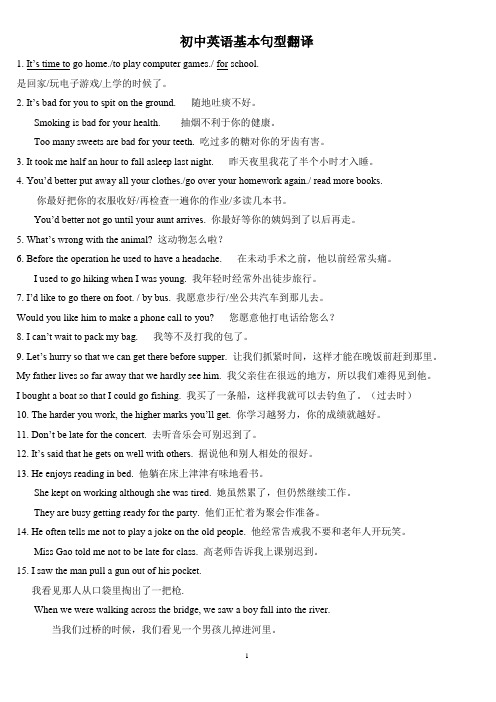
初中英语基本句型翻译1. It’s time to go home./to play computer games./ for school.是回家/玩电子游戏/上学的时候了。
2. It’s bad for you to spit on the ground. 随地吐痰不好。
Smoking is bad for your health. 抽烟不利于你的健康。
Too many sweets are bad for your teeth. 吃过多的糖对你的牙齿有害。
3. It took me half an hour to fall asleep last night. 昨天夜里我花了半个小时才入睡。
4. You’d better put away all your clothes./go over your homework again./ read more books.你最好把你的衣服收好/再检查一遍你的作业/多读几本书。
You’d better not go until your aunt arrives. 你最好等你的姨妈到了以后再走。
5. What’s wron g with the animal? 这动物怎么啦?6. Before the operation he used to have a headache. 在未动手术之前,他以前经常头痛。
I used to go hiking when I was young. 我年轻时经常外出徒步旅行。
7. I’d like to go there on foot. / by bus. 我愿意步行/坐公共汽车到那儿去。
Would you like him to make a phone call to you? 您愿意他打电话给您么?8. I can’t wait to pack my bag. 我等不及打我的包了。
9. Let’s hurry so that we can get there before supper. 让我们抓紧时间,这样才能在晚饭前赶到那里。
英语疑问句

• 2. 当你在2012年被评为感动温州的十大人物之一的时候,你感觉怎样?
How did you feel when you were honored as one of the top 10 figures who moved Wenzhou most in 2012?
• 3. 你将如何安排你未来的志愿者活动?
I want to ask him whether he will keep on picking up garbage on the Daluo Mountain. I want to ask him what attracted him to China. I want to ask him whether his relatives support his idea that he picks up garbage on the Daluo Mountain. I want to ask him how he felt when he was honored as one of the top 10 figures who moved Wenzhou most in 2012.
英语疑问句
• 一般疑问句 • 特殊疑问句
一般疑问句:可以用yes或no回答的问句
• 大声朗读,总结特点 • Can you speak English? • Can he swim? • Have you been living here? • Does he go to school on foot? • Will you be free tonight? • Are you tired? 翻译: 1. 你会坚持去大罗山捡垃圾吗?
3. 你可以去我们学校给我们做演讲吗?
Can you go to our school to give us a speech?
中考英语反义疑问句的14种常考特殊用法

中考英语反义疑问句的14种常考特殊用法一、反意疑问句反意疑问句是由陈述句和附在其后的附加疑问句组成。
其中附加疑问句是对陈述句所说的事实或观点提出疑问,起证实作用,一般用于证实说话者所说的事实或观点。
(表示说话者对某事有一定看法,但又不完全确定,需要对方加以证实。
)翻译为“是吗”二、反意疑问句的回答回答时,事实是肯定的用Yes;若事实是否定的则用No。
三、反意疑问句的特殊情况1.反意疑问句中问句部分的动词与陈述部分的动词在语气上成相反的对应关系,即:肯定+否定?否定+肯定?You can’t do it,can you?你不能做它,是吗?They are very late for the meeting,aren’t they?他们开会迟到了,是吗?2.附加问句的主语应与陈述句的主语保持一致,且只能用人称代词替代。
You come from Beijing,don't you?你来自北京,是不是?3.当陈述句中含有be动词,助动词,或是情态动词时,反问句部分由这些词加上主语人称代词构成:Be动词包括:am,is,are,was,were助动词有:do,does,did,have(用在完成时),has (用在完成时)等情态动词有:can,could,may,might,must,will,would,shall ,shouldHe will go home,won’t he?他要回家了,是吗?She doesn’t like to eat popcorn,does she? 她不喜欢吃爆米花,是吗?4.have的不同用法,反义疑问句用不同的动词(1)have表“有”时,反义疑问句谓语动词用have/do都行He has a new car,doesn’t/hasn’t he? (2)have表“吃,喝,玩,度过,举办”等是,反义疑问句谓语动词用doHe has supper at home every day,doesn’t he? They had a good time in Beijing,didn’t they?(3)have to表“不得不,必须”时,反义疑问句谓语动词用doKite has to help her mother,doesn’t she?(4)had better表“最好”时,反义疑问句谓语动词用hadWe had better go to school at once,hadn't we?(5)have用在完成时中,反义疑问句谓语动词用haveThey have known the matter,haven’t they? [6_副本.jpg]5.(1)反意疑问句的陈述部分带有little,few,never,hardly,seldom,nobody,nothing,no one,none,neither等否定意义的词时,问句部分用肯定式。
初中英语反义疑问句的用法归纳
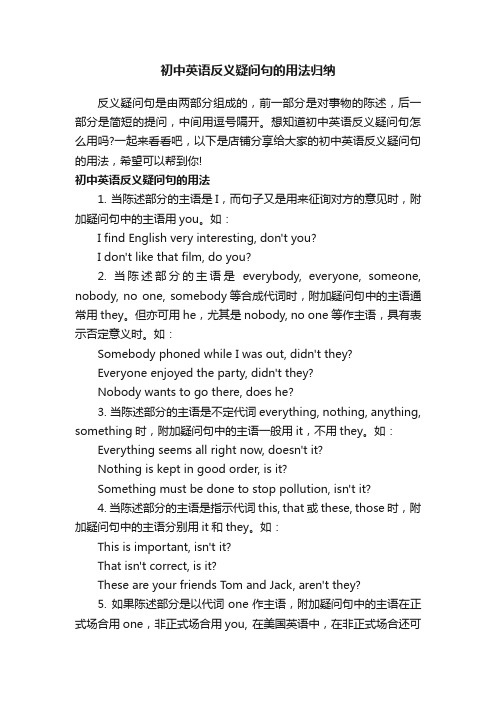
初中英语反义疑问句的用法归纳反义疑问句是由两部分组成的,前一部分是对事物的陈述,后一部分是简短的提问,中间用逗号隔开。
想知道初中英语反义疑问句怎么用吗?一起来看看吧,以下是店铺分享给大家的初中英语反义疑问句的用法,希望可以帮到你!初中英语反义疑问句的用法1. 当陈述部分的主语是I,而句子又是用来征询对方的意见时,附加疑问句中的主语用you。
如:I find English very interesting, don't you?I don't like that film, do you?2. 当陈述部分的主语是everybody, everyone, someone, nobody, no one, somebody等合成代词时,附加疑问句中的主语通常用they。
但亦可用he,尤其是nobody, no one等作主语,具有表示否定意义时。
如:Somebody phoned while I was out, didn't they?Everyone enjoyed the party, didn't they?Nobody wants to go there, does he?3. 当陈述部分的主语是不定代词everything, nothing, anything, something时,附加疑问句中的主语一般用it,不用they。
如:Everything seems all right now, doesn't it?Nothing is kept in good order, is it?Something must be done to stop pollution, isn't it?4. 当陈述部分的主语是指示代词this, that或these, those时,附加疑问句中的主语分别用it和they。
如:This is important, isn't it?That isn't correct, is it?These are your friends Tom and Jack, aren't they?5. 如果陈述部分是以代词one作主语,附加疑问句中的主语在正式场合用one,非正式场合用you, 在美国英语中,在非正式场合还可以用he。
翻译疑问句——精选推荐
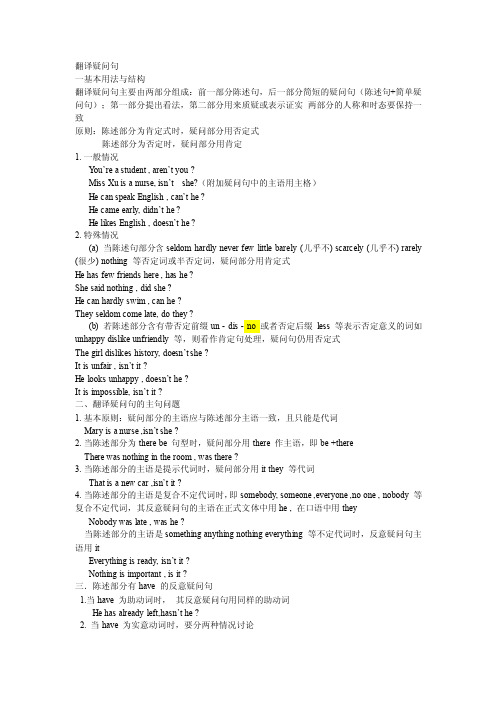
翻译疑问句一基本用法与结构翻译疑问句主要由两部分组成:前一部分陈述句,后一部分简短的疑问句(陈述句+简单疑问句);第一部分提出看法,第二部分用来质疑或表示证实两部分的人称和时态要保持一致原则:陈述部分为肯定式时,疑问部分用否定式陈述部分为否定时,疑问部分用肯定1.一般情况Y ou’re a student , aren’t you ?Miss Xu is a nurse, isn’t she?(附加疑问句中的主语用主格)He can speak English , can’t he ?He came early, didn’t he ?He likes English , doesn’t he ?2.特殊情况(a) 当陈述句部分含seldom hardly never few little barely (几乎不) scarcely (几乎不) rarely (很少) nothing 等否定词或半否定词,疑问部分用肯定式He has few friends here , has he ?She said nothing , did she ?He can hardly swim , can he ?They seldom come late, do they ?(b) 若陈述部分含有带否定前缀un - dis - no 或者否定后缀less 等表示否定意义的词如unhappy dislike unfriendly 等,则看作肯定句处理,疑问句仍用否定式The girl dislikes history, doesn’t she ?It is unfair , isn’t it ?He looks unhappy , doesn’t he ?It is impossible, isn’t it ?二、翻译疑问句的主句问题1.基本原则:疑问部分的主语应与陈述部分主语一致,且只能是代词Mary is a nurse ,isn’t she ?2.当陈述部分为there be 句型时,疑问部分用there 作主语,即be +thereThere was nothing in the room , was there ?3.当陈述部分的主语是提示代词时,疑问部分用it they 等代词That is a new car ,isn’t it ?4.当陈述部分的主语是复合不定代词时,即somebody, someone ,everyone ,no one , nobody 等复合不定代词,其反意疑问句的主语在正式文体中用he , 在口语中用they Nobody was late , was he ?当陈述部分的主语是something anything nothing everything 等不定代词时,反意疑问句主语用itEverything is ready, isn’t it ?Nothing is important , is it ?三.陈述部分有have 的反意疑问句1.当have 为助动词时,其反意疑问句用同样的助动词He has already left,hasn’t he ?2. 当have 为实意动词时,要分两种情况讨论A.若表示所有,反意疑问句可以用have 也可以用doHe has a lot of friends here , hasn’t (doesn’t ) he ?B. 若表示吃玩等意思,反意疑问句要用doHe has supper at 5 , doesn’t he?He had a good time at the party, didn’t he ?四.含情态动词的反意疑问句1 基本原则:在通常情况下,当陈述部分含情态动词时,疑问部分会重复前面同样的情态动词He can speak English , can’t he ?We shouldn’t go, should we ?2. 当陈述部分含有must 时,分情况讨论A.若must 表示必须或有必要,疑问部分用mustn’t / needn’tY ou must leave at once , mustn’t you ?但陈述部分有mustn’t 表示禁止,疑问部分则要用mustY ou mustn’t laugh, must you ?B. 若must 表示推测,疑问部分不能用must ,而应根据must 后的动词采用相应的动词形式He must be tired , isn’t he ?五.陈述部分为祈使句的反意疑问句1 基本原则若陈述部分为祈使句,疑问部分通常用will youPlease help us, will you ?Give me a hand , will you ?Come with us , will you ?Don’t forget to post the letter , will you ?2.当祈使句为let’s 时,疑问句部分必须用shall weLet’s go there together ,shall we ?六.陈述部分为主从复合句的反意疑问句1. 当陈述部分谓语为think (believe suppose expect imagine ) that 等时,疑问部分通常与从句主谓保持一致I think that it is too short , isn’t it ?(否定的后移)当这些动词后接的宾语从句的否定转移到主句时,其仍属于否定句,故后面的简短问句用肯定形式I don’t believe that he can translate this book, can he?I don’t think he will come , will he ?(注) 这类用法主要限于主语为第一人称且think 等动词为一般现在时的情形七.几种特殊情况的反意疑问句1. I’m wrong , aren’t i ?2. I wish to go with them , may I ?3. 当陈述部分有had better 时,疑问部分用hadn’t八反意疑问句回答They work hard , don’t they ?Y es , they doThey don’t work hard , do they ?Y es they do .He can speak English, can’the?(附加疑问句中的主语用主格)He came early, didn’t he?(附加疑问句中的主语用主格)He likes English, doesn’t he他喜欢英语,是吗?(附加疑问句中的主语用主格)He doesn’tlike English, does he?他不喜欢英语,是吗?(附加疑问句中的主语用主格)教你如何用WORD文档(2012-06-27 192246)转载▼标签:杂谈1. 问:WORD 里边怎样设置每页不同的页眉?如何使不同的章节显示的页眉不同?答:分节,每节可以设置不同的页眉。
全国通用版初三英语反意疑问句必考知识点归纳

(每日一练)全国通用版初三英语反意疑问句必考知识点归纳单选题1、—Don’t stay up too late any longer, ________?—Thanks. I know it is bad for my health.A.do youB.will youC.won’t youD.shall you答案:B解析:句意:——别再熬夜了,好吗?——谢谢。
我知道这对我的健康有害。
考查反意疑问句。
除了Let’s...用shall we,祈使句的反意疑问句will you的形式,故选B。
2、—This zoo isn't open to the public on Mondays,________?—No,it isn't.A.is itB.isn't itC.will itD.won't it答案:A解析:句意:——这个动物园在星期一不面向公众开门,是吗?——是的,不开门。
此处是反义疑问句,前半句是否定句,后半句用肯定句,前半句的助动词isn’t,故此处的助动词用is,故选A。
3、There used to be a church in the small town, _______?A.used thereB.usedn’t itC.used itD.usedn’t there答案:D解析:句意:过去这个小镇上有一座教堂,不是吗?考查There be句型的反意疑问句。
根据英语语法,There be句型和used to连用时,它的反意句的省略部分有两种做法:didn’t there或usedn’t there。
D选项符合句意,故选D。
4、They have breakfast at home, __________ they?A.haveB.haven’tC.don’tD.do答案:C解析:句意:他们在家吃早餐,不是吗?考查反意疑问句。
反意疑问句遵循“前肯后否,前否后肯”原则,陈述句是肯定句,所以反问部分是否定,排除AD选项,另外have“吃”,是实义动词,反问部分需借助助动词do。
2022届初中英语反义疑问句考点总结

(每日一练)2022届初中英语反义疑问句考点总结单选题1、—You didn’t find the owner of the books, did you?— _____. So I gave them to our teacher.A.No, I didB.Yes, I didn’tC.No, I didn’tD.Yes, I did答案:C解析:句意:--你没有找到书的主人,是吗?--是的,没有找到,所以我把它们给了我们老师。
本题考查反意疑问句,前否后肯的反意疑问句的答语,回答只有两种形式:Yes, I do或 No,I don't(绝对没有以下形式:Yes, I don't或 No,,I do)理解答语时,必须注意要和平时相反:即Yes理解为“不”,No理解为“是”,所以首先排除A和B,时态为一般过去时,所以用did或didn’t,由所给空后面的So I gave them to our teacher可知,“是的,我没有找到书的主人”符合语境,排除D,故答案选C。
2、—Most people in Italy didn’t wear masks first, did they?—________. The Italians like to enjoy their freedom as well as other westerners.A.Yes, they didB.No, they didn’tC.Yes, they wereD.No, they weren’t答案:B解析:句意:——意大利的大多数人一开始不戴口罩,是么?——是的,他们不戴。
意大利人和其他西方人一样,喜欢自由。
考查反意疑问句。
根据“did they”可知回答用助动词did。
根据“didn’t wear masks first”及“The Italians like to enjoy their freedom”可知是否定回答,用“no, they didn’t”。
九年义务初中英语反义疑问句知识点总结(超全)

(每日一练)九年义务初中英语反义疑问句知识点总结(超全)单选题1、—Your sister is not a nurse, is she?—________. She teaches Chinese in a primary school.A.No, she is notB.Yes, she isC.Yes, she is notD.No, she is答案:A解析:句意:——你姐姐不是护士,是吗?——是的,她不是。
她在一所小学教语文。
考查情景交际。
此处需要对反意疑问句进行回答,要根据实际情况来回答;根据答句中“She teaches Chinese ina primary school.”可知她不是护士,用否定回答“No, she is not”来表示“是的,她不是”。
故选A。
2、—You won’t follow his exam ple, will you?—________. I don’t think he is right.A.No, I won’tB.Yes, I willC.No, I willD.Yes, I won’t答案:A解析:句意:——你将不以他为榜样,是吗?——是的,我认为他不对。
考查反意疑问句的回答。
反意疑问句中Yes翻译为“不是”,后接肯定形式;No翻译为“是的”,后接否定形式;排除C/D选项;根据“I don’t think he is right”可知,这里应该用否定,表示“是的,我不会学他”,故选A。
3、There were few types of cameras in this shop, ________?A.were thereB.weren't thereC.were theyD.weren't they答案:A解析:句意:这家店的照相机种类很少,________?考查反意疑问句。
这是there be句型,变反意疑问句时用be+there,排除C,D。
(文末附答案)九年义务初中英语反义疑问句知识点汇总

(每日一练)(文末附答案)九年义务初中英语反义疑问句知识点汇总单选题1、Nobody wants to go there, ________?A.does heB.doesn't heC.will heD.won't he2、—He doesn’t speak English or Japanese, ______ ?—______. He speaks Chinese.A.does he; Yes, he doesn’tB.doesn’t he; No, he doesC.does he; No, he doesn’tD.does he; Yes, he does 3、—Your brother doesn’t get up early, does he?— ________. But he always gets up late on the weekend.A.No, he doesn’tB.Yes, he doesC.No, he doesD.Yes, he doesn’t4、It's hot in Tom's country,? Tom doesn't like it,?A.isn't it;doesn't TomB.is it;does heC.isn't it;does heD.is it;doesn't he5、Tony used to be shy, _________ he?A.didn’tB.doesn’tC.hadn’tD.hasn’t6、—Jim’s already back from the USA, ________ he?—_______. Now he’s taking a rest in the next room.A.hasn’t; YesB.has; NoC.isn’t; YesD.is; No7、It seldom snows in winter here,_______?A.does itB.doesn’t itC.do itD.don’t it8、I don’t suppose anyone will escape from such a big earthquake, _______?A.do IB.don’t IC.will theyD.won’t they9、Our grandparents hardly have a meal in the restaurant,___________?A.haven't theyB.do theyC.have theyD.don't they10、Your father 's been to Guangzhou twice, ________?A.has heB.hasn't heC.doesn't heD.isn't he11、Jackie has to give up his plan, _______ _______?A.hasn’t heB.hasn’t JackieC.doesn’t heD.doesn’t Jackie12、They used to go shopping together, ________?A.didn’t theyB.weren’t t heyC.did theyD.used they13、-Wang Bin has never stopped smoking, ____________ he?- ____________, he hasn't. Although his wife always advises him not to.A.has, YesB.hasn't, YesC.has, NoD.hasn't, No14、—He’s already back to China, ________?—________. He is on a visit to Shanghai.A.isn’t he; NoB.hasn’t he; YesC.isn’t he; YesD.hasn’t he; No15、There ________ many old buildings in this street ten years ago, ________ there? A.is, isn'tB.was, wasC.were, weren'tD.were, was九年义务初中英语反义疑问句_019参考答案1、答案:A解析:句意:没有人想去那,对吗?考查反义疑问句。
- 1、下载文档前请自行甄别文档内容的完整性,平台不提供额外的编辑、内容补充、找答案等附加服务。
- 2、"仅部分预览"的文档,不可在线预览部分如存在完整性等问题,可反馈申请退款(可完整预览的文档不适用该条件!)。
- 3、如文档侵犯您的权益,请联系客服反馈,我们会尽快为您处理(人工客服工作时间:9:00-18:30)。
初中英语翻译疑问句
1) 陈述部分的主语是I,疑问部分要用aren't I.
I'm as tall as your sister,aren't I?
2) 陈述部分的谓语是wish,疑问部分要用may +主语。
I wish to have a word with you, may I?
3) 陈述部分用no, nothing, nobody, never, few, seldom, hardly, rarely, little等否定含义的词时,疑问部分用肯定含义。
The Swede made no answer, did he / she?
Some plants never blown (开花), do they ?
4) 含有ought to 的反意疑问句,陈述部分是肯定的,疑问部分用shouldn't / oughtn't +主语。
He ought to know what to do, oughtn't he? / shouldn't he?
5) 陈述部分有have to +v. (had to + v.),疑问部分常用don't +主语(didn't +主语)。
We have to get there at eight tomorrow, don't we?
6) 陈述部分的谓语是used to 时,疑问部分用didn't +主语或usedn't +主语。
He used to take pictures there, didn't he? / usedn't he?
7) 陈述部分有had better + v. 疑问句部分用hadn't you?
You'd better read it by yourself, hadn't you?
8) 陈述部分有would rather +v.,疑问部分多用wouldn't +主语。
He would rather read it ten times than recite it, wouldn't he?
9) 陈述部分有You'd like to +v. 疑问部分用wouldn't +主语。
You'd like to go with me, wouldn't you?
10) 陈述部分有must 的疑问句,疑问部分根据实际情况而定。
He must be a doctor, isn't he?
You must have studied English for three years, haven't you? / didn't you?
He must have finished it yesterday, didn't he?
11) 感叹句中,疑问部分用be +主语。
What colours, aren't they?
What a smell, isn't it?
12) 陈述部分由neither…nor, either…or 连接的并列主语时,疑问部分根据其实际逻辑意义而定。
Neither you nor I am engineer, are we?
13) 陈述部分主语是指示代词或不定代词everything, that, nothing, this, 疑问部分主语用it。
Everything is ready, isn't it?
14) 陈述部分为主语从句或并列复合句,疑问部分有三种情况:
a. 并列复合句疑问部分,谓语动词根据邻近从句的谓语而定。
Mr. Smith had been to Beijing for several times, he should have been in China now, shouldn't he?
b. 带有定语从句,宾语从句的主从复合句,疑问部分谓语根据主句的谓语而定:
He is not the man who gave us a talk, is he?
He said he wanted to visit Japan, didn't he?
c. 上述部分主句谓语是think, believe, expect, suppose, imagine等引导的定语从句,疑问部分与宾语从句相对应构成反意疑问句。
I don't think he is bright, is he?
We believe she can do it better, can't she?
15) 陈述部分主语是不定代词everybody, anyone, somebody, nobody, no one等,疑问部分常用复数they,有时也用单数he。
Everyone knows the answer, don't they?(does he?)
Nobody knows about it, do they? (does he?)
16) 带情态动词dare或need的反意疑问句,疑问部分常用need (dare ) +主语。
We need not do it again, need we ?
He dare not say so, dare you?
当dare, need 为实义动词时,疑问部分用助动词do + 主语。
She doesn't dare to go home alone, does she?
17) 省去主语的祈使句的反意疑问句,疑问部分用will you。
Don't do that again, will you?
Go with me, will you / won't you ?
注意:Let's 开头的祈使句,后用shall we?
Let us 开头的祈使句,后用will you?
Let's go and listen to the music, shall we?
Let us wait for you in the reading-room, will you ?
18) 陈述部分是"there be"结构的,疑问部分用there省略主语代词。
There is something wrong with your watch, isn't there?
There will not be any trouble, will there?
19) 否定前缀不能视为否定词,其反意疑问句仍用否定形式。
It is impossible, isn't it?
He is not unkind to his classmates, is he?
20) must在表"推测"时,根据其推测的情况来确定反意疑问句。
He must be there now, isn't he?
It must be going to rain tomorrow, won't it?
快速记忆表
陈述部分的谓语疑问部分
I aren't I
Wish may +主语
no,nothing,nobody,never,
few, seldom, hardly, 肯定含义
rarely, little等否定
含义的词
ought to(肯定的)shouldn't/ oughtn't +主语
have to+v.(had to+v.) don't +主语(didn't +主语)
used to didn't +主语或usedn't +主语
had better + v. hadn't you
would rather + v. wouldn't +主语
you'd like to + v. wouldn't +主语
must 根据实际情况而定
感叹句中be +主语
Neither…nor,
either…or 连接的根据其实际逻辑意义而定
并列主语
指示代词或不定代词
everything,that, 主语用it
nothing,this
并列复合句谓语根据邻近从句的谓语而定
定语从句,宾语从句的
主从复合句根据主句的谓语而定
think,believe,expect,
suppose,imagine等引导与宾语从句相对应的从句everybody,anyone,
somebody,nobody,no one 复数they, 单数he
情态动词dare或need need (dare ) +主语
dare, need 为实义动词do +主语
省去主语的祈使句will you?
Let's 开头的祈使句Shall we?
Let us 开头的祈使句Will you?
there be 相应的谓语动词+there(省略主语代词)
否定前缀不能视为否定词仍用否定形式
must表"推测"根据其推测的情况来确定反意疑问句。
